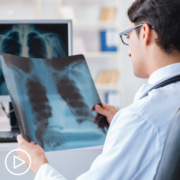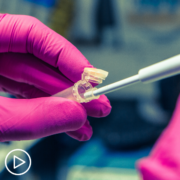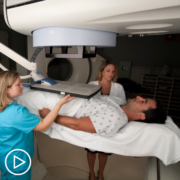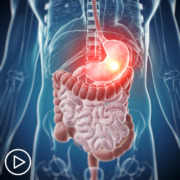What Essential Testing Reveals About Your Non-Small Cell Lung Cancer
What Essential Testing Reveals About Your Non-Small Cell Lung Cancer from Patient Empowerment Network on Vimeo.
What do lung cancer test results reveal to your healthcare team about your disease? Dr. Isabel Preeshagul provides an overview of essential testing for lung cancer and explains the difference between germline and somatic mutations.
Dr. Isabel Preeshagul is a thoracic medical oncologist at Memorial Sloan Kettering Cancer Center. Learn more about Dr. Preeshagul.
See More From INSIST! Lung Cancer
Related Resources:

|

Non-Small Cell Lung Cancer Treatment Options | Personalizing Therapy |

Non-Small Cell Lung Cancer Treatment | Clinical Trials and Research Updates |
Transcript:
Katherine Banwell:
I’d like to turn to the clinical side of non-small cell lung cancer. What tests help you identify the type and stage of lung cancer?
Dr. Isabel Preeshagul:
Obviously, you need a CAT scan. You need a CAT scan of the chest, abdomen, pelvis, and you need an MRI brain and a PET scan.
Those are really the gold standards for determining clinical staging. In regards to pathologic staging, it’s really important to have tissue samplings. So, you biopsy a site of disease that’s concerning to you. If it looks like there’s only disease in the chest, you want to biopsy the site where there’s the tumor, and then you talk with your thoracic surgery or pulmonary team to determine the best way to sample the mediastinum for full staging.
Katherine Banwell:
Why is an accurate diagnosis so important?
Dr. Isabel Preeshagul:
So, an accurate diagnosis is so important, because lung cancer is by no means black and white anymore. There are so many histologic subtypes that we are learning about. There are so many different molecular drivers that we are learning about. So, making sure you have the right diagnosis, full and next-generation sequencing testing, all of the imaging that you need could really make or break your treatment plan.
Katherine Banwell:
Dr. Preeshagul, let’s talk about biomarker testing. How is biomarker testing for lung cancer different from hereditary genetic testing?
Dr. Isabel Preeshagul:
So, we do do hereditary genetic testing for lung cancer patients as well. So, I think let’s backtrack a little bit. When you’re doing on a patient, there are germline mutations and there are somatic mutations. And germline mutations are mutations that you might get from Mom and Dad that they got from their parents and so on and so forth that you could give to your children or your brother and sister or whatever. So, that’s germline testing that could be passed along.
That would be like BRCA or any other APC gene, but we are learning more and more that there are mutations in lung cancer that do have a hereditary aspect to them. So, we are learning now that while we do somatic testing, which is to find a mutation that just spontaneously happened in your tumor all on its own, it’s really important to pair that with germline testing to make sure that there isn’t some kind of heritable mutation that’s also driving this lung cancer.
Katherine Banwell:
You mentioned hereditary genetic testing. Should family members of people with lung cancer undergo genetic testing then just to be reassured?
Dr. Isabel Preeshagul:
So, if there is a germline mutation, then they should – the family members should be referred to a geneticist to have that discussion.
Katherine Banwell:
What are common lung cancer biomarkers?
Dr. Isabel Preeshagul:
So, we have nine biomarkers within approval right now, but there are so many. There’s more than I could even talk about today. But some of the more common ones are EGFR, ALK, ROS1, MET exon 14. You have KRAS, KRAS-G12C, which is a newer one. We have NTRK. We have RET. The list goes on, HER2. I could talk for – there’s not enough time on this Zoom video to talk about all of the mutations. But there are nine mutations with approvals as of now to date, this very moment. That could change tomorrow.










